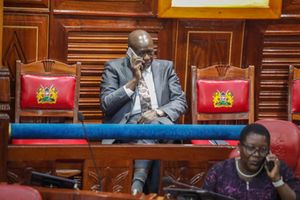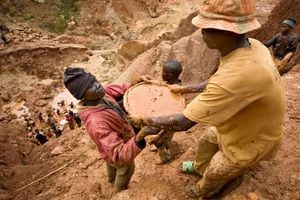
Former Deputy President Rigathi Gachagua and his legal counsel Paul Muite before the Senate in Nairobi on October 17, 2024 during the second day of his impeachment trial.
Why, oh why are we devoting so much time to the Rigathi Gachagua saga when the country is facing an avalanche of challenges and problems?
I am not saying that the impeachment hearings in Parliament were trivial or even unimportant. What I am worried about is that they risk becoming or being used to create a distraction from the main issues in Kenya and maybe also as a vehicle for some to settle scores.
Let us try and set it in the context of where we are at in the country as a whole.
There is a provision in the Constitution for what took place in the National Assembly and the Senate. Whether or not it was followed as it should be is another question. The courts will determine that.
The Gachagua impeachment is in theory a checks and balances one to ensure accountability, good governance and adherence to the rule of law.
Social Health Insurance Fund
Considering how many of us worked for the strengthening of our institutions I am all for this.
But what concerns me now is that the country is facing an avalanche of diverse challenges, some of them immense, and we must not be distracted.
A recent example is the move from the National Hospital Insurance Fund to the NHIF to the Social Health Insurance Fund. Despite what the government is formally telling us, the public health operation has been plunged into chaos and confusion by the transition.
Remember our public health system struggles on the best of days so that means in a number of places it ground to a halt. Even now there is confusion in many places despite assurances by the Health ministry.
For the many Kenyans dependent on the public health system, what is happening is horrible, especially if one was standing in a long queue waiting for medical services.
Another part of the avalanche is the worry that several donors — including multilateral ones — have held back from disbursing funds and in some cases are presenting tough conditions for new money.
That means the flow of vital money to balance of payments, debt service support and key government operations gets disrupted. That in turn means the economy faces further impediments to its already slow operations.
If manufacturers are seeing their order books shrinking by around a quarter, then increased handbrakes on economic and commercial activity will just slow it further.
And that is what is happening. The economy is slowing down.
Graft
Another part of the avalanche is the multiplicity of graft in the system. It appears that taxpayers stand to lose in excess of Sh6 billion in the edible oils imports scam alone that was initiated by the Kenya National Trading Corporation through a third party. The imported oil was close to expiry date and some question whether it was actually fit for human consumption.
As stated before, a perusal of the government accounts for the last financial year shows a large chunk of money badged as ‘miscellaneous’. By default, that means it has not been fully accounted for.
A glimpse at the projected accounts for the current financial year also show a sizeable figure for expenditure that is just not clearly spelt out.
What these three examples show is that the graft or grey areas are both pervasive and affecting the whole macro economy.
We have the rush of sign the Adani deals, which are being thrust upon us. I do not believe they have been scrutinised enough and we are in for some shocks. These are major long-term agreements of macro-economic importance.
Jobs
This, in turn, brings up another factor, which is that this economy is just not creating the sort of jobs and opportunities that are needed for the people coming into it and looking for gainful formal and informal employment each and every year. That means there is a growing pool of joblessness. There is not the confidence. The talk of the town is how to consolidate and even contract rather than to expand.
The consequences of this are scary. Idle people are restless people and more likely to add to social fluidity in the country.
Kenya has had several in recent times. We speak a lot about the Gen Z protests that started in June, but they are just one prominent example of several.
Lack of opportunities in Kenya is arguably the biggest single challenge facing the country and is an underlying factor in the various demonstrations that have taken place.
In conclusion, it is imperative that we must not allow our eyes to be taken off the core, gut issues which are confronting our country.
The Gachagua factor is an issue but it must be viewed in the context of all the other issues. Last but not least, we need to remember that the embattled Deputy President was elected as part of a team with none other than President William Ruto.
Robert Shaw is a public policy and economic analyst; [email protected]









